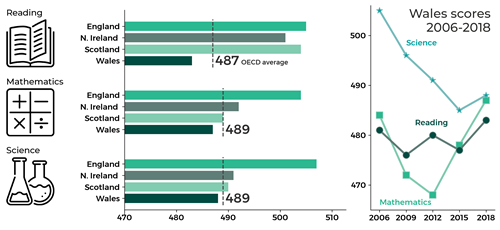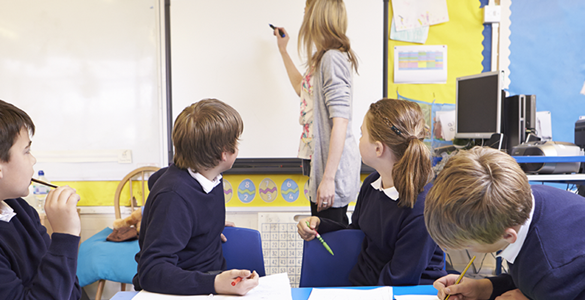Like many other big day to day policy challenges, Wales’ national mission to raise educational standards has arguably had to be put on the back burner during the pandemic. Schools have essentially been treading water during much of the past two years, mainly striving to maintain provision rather than improve it.
We’re now hopefully emerging from the crisis phase of COVID-19 and its massive disruption to education, and attention is turning back to more ordinary, although very important, policy issues.
The Minister for Education and Welsh Language is making a statement in Plenary tomorrow (22 March) titled “High Standards and Aspirations for All”, when he is expected to provide an update on the Welsh Government’s plans for educational improvement. This article provides background information in advance of the statement.
Over a decade since the “wake up call to a complacent system”
As our articles explained in October 2020 and November 2021, the Welsh Government has been trying to improve educational standards for well over a decade. The watershed moment was the 2009 Programme for International Student Assessment (PISA) results, which delivered a “wake up call to a complacent system”.
To deal with the fall out of the 2009 results, the Welsh Government sought advice from the Organisation for Economic Co-operation and Development (OECD) – in 2014, 2017 and 2020. There was a renewed policy focus on literacy and numeracy (and more recently digital competence) as well as targeted intervention and support for underperforming schools. There was also a big shift to a regional approach where local authorities were induced to collaborate through consortia to pool their school improvement services.
The Welsh Government also placed considerable emphasis on closing the attainment gap between disadvantaged pupils (those eligible for free school meals and Looked After Children) and their peers. This has been mainly through the Pupil Development Grant (PDG) which tops up school budgets based on the numbers of such pupils on their roll. However, as Estyn reported in February 2020, “the ‘poverty gap’ has not narrowed” and still “typically widens as learners get older”. GCSE and A/AS level results during the pandemic suggest the attainment gap might have got worse.
Wales’ PISA scores improved to some extent in the latest (2018) results, although they were still the lowest of the UK nations as the following infographic shows:
Wales’ PISA scores in 2018 and previous cycles

Then, on the eve of the pandemic, the local/regional approach to school improvement went into a considerable state of flux in one of the four regions – South West and Mid Wales. Neath Port Talbot left the regional school improvement consortium, ERW, and three of the remaining five authorities gave notice of their intention to leave at the end of March 2021. This posed a big challenge to the Welsh Government’s relatively recent ambition to drive school improvements through a regional approach.
The pandemic “undoubtedly slowed progress”
Schools were forced to focus on the challenges of remote teaching during the lockdowns and then the intermittent face to face teaching when regulations allowed. In turn, the Welsh Government suspended both school categorisation (a traffic light system designating where schools are at in terms of improvement) and school performance measures.
Estyn reported in January 2021 that “the workload associated with responding to the pandemic has undoubtedly slowed progress” in delivering on-going priorities such as school improvement. The Welsh Government’s COVID-19 educational recovery plan, “Renew and Reform”, of June 2021 (updated September 2021) went on to focus on learners’ well-being and progression in the context of the pandemic.
Exams were cancelled in both 2020 and 2021, with exceptional arrangements put in place which sought simultaneously to provide fairness to current cohorts whilst maintaining public confidence in, and the credibility of, the qualifications system. Exams will return this year, although problems of comparability due to the unique circumstances of this and the past two years mean it will be difficult to draw any conclusions about recent and future progress on raising standards.
Renewed ambitions for school standards
The Welsh Government restated its long term ambition to improve school standards in its Programme for Government 2021-26. One of its ten well-being objectives is to “continue our long-term programme of education reform, and ensure educational inequalities narrow and standards rise”. The Minister for Education and Welsh Language also outlined his plans to improve children’s oracy and reading, in Plenary on 16 November 2021.
The Welsh Government also appears to have continued with some of the work initiated before the pandemic around school improvement. It has piloted a national resource to support schools with their self-evaluation and improvement and commissioned research to inform new performance measures which are intended to align with the new Curriculum for Wales.
In previous years, the Welsh Government had a dedicated budget line for “Raising School Standards” which could be tracked to demonstrate the commitment to spend an additional £100 million on raising school standards throughout the last Senedd. Whist this budget line is discontinued in the 2022-23 budget, the Minister assured the Children, Young People and Education (CYPE) Committee in January (paras 78-84) that the change was “presentational” and that the Welsh Government would actually be spending more money than before on school standards.
In terms of regional working, several new partnerships have now been set up in South West and Mid Wales to replace the previous ERW consortium. Estyn reported last year that the “lack of a clear plan” had been a “significant concern” and also told the CYPE Committee in December 2021 that “the energy that’s gone into the discussions and the restructuring and the reorganisation clearly has taken time and resource away from directly providing support to schools”. Estyn said it would monitor the impact the new arrangements have on standards in South West and Mid Wales.
What happens next?
The Welsh Government is placing considerable stock on the contribution that the new Curriculum for Wales could make to raise standards. However, the very fact that Wales is embarking on such major curriculum (and Additional Learning Needs) reforms may pose the biggest challenge to the school standards agenda yet in terms of the scale of the ambitions for change. Add to this, a context in which school budgets have come under considerable pressure and the way in which they are funded subject to scrutiny.
Many stakeholders will be eager to hear how the Welsh Government intends to re-energise the school improvement agenda and continue its national mission to raise standards. This is even more pertinent as Wales’ education system, like all other public services, hopes to finally emerge from the two-year shock that the pandemic has wrought.
You can watch the Minister’s statement (scheduled for around 3.30 pm on Tuesday 22 March) on Senedd TV and read the transcript around 24 hours later.
Article by Michael Dauncey, Senedd Research, Welsh Parliament






